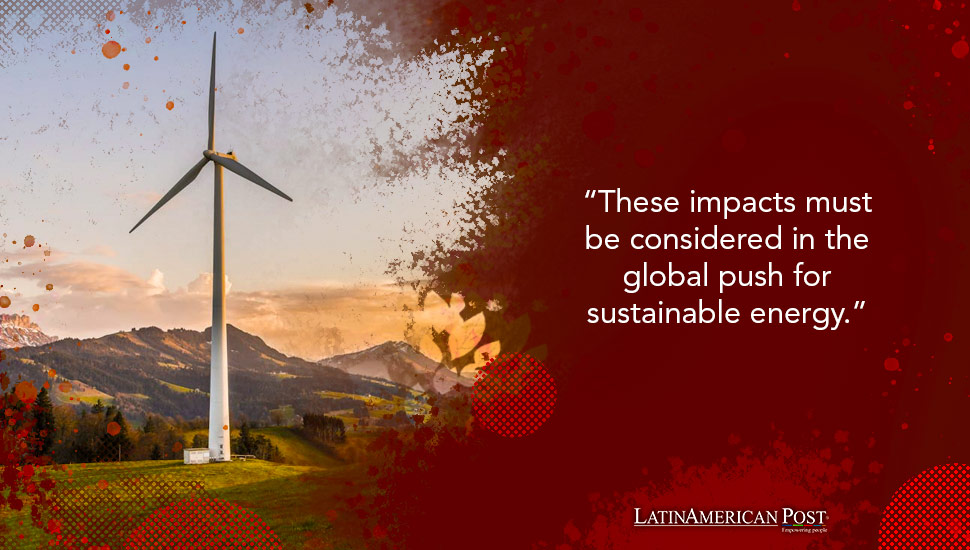The Environmental Pitfalls of Alternative Energy Sources in Latin America

Alternative energy sources like wind power, often touted as environmentally friendly, have significant adverse effects on local communities and ecosystems. These impacts must be considered in the global push for sustainable energy.
As the world increasingly turns to alternative energy sources to combat climate change, the urgency of examining the environmental and social costs of these supposedly green solutions cannot be overstated. In Brazil’s impoverished Northeast, cousins Nilson José dos Santos and Geremias da Cruz dos Anjos have experienced firsthand the dramatic changes brought by wind energy projects. While beneficial in some respects, these projects have also led to significant disruptions, highlighting the complex reality of alternative energy.
The rugged, drought-prone land of Brazil’s Northeast may not be suitable for commercial farming, but it has proven ideal for harvesting wind energy. Italian energy company Enel Green Power has invested over $1.4 billion in one of Latin America’s largest wind farms, with 372 turbines. This massive development has had vastly different impacts on nearby communities.
In Sumidouro, a formally recognized quilombo (a community of Afro-Brazilian runaway slave descendants), the presence of wind turbines has been relatively positive. Thanks to land ownership and formal recognition, the community negotiated with Enel to keep the turbines at a distance and secure vital amenities such as running water. The improvements in Sumidouro include a sports court, a cultural center, and a community water system, illustrating how engagement and negotiation can lead to significant community benefits and inspire hope for a more equitable future.
Conversely, the nearby community of Lagoa, which lacks formal recognition, has yet to farefared. Without official status, the 22 families in Lagoa did not receive the same benefits. They endure the turbines’ noise and face issues such as cracked walls, heavy dust from truck traffic, and a lack of piped water. This disparity underscores the critical role of government recognition in protecting and empowering local communities against the potentially adverse effects of alternative energy projects, and the urgent need for social justice in these situations.
Environmental and Social Costs
While wind power is often heralded as a clean energy source, it is not without environmental and social costs. In Sumidouro, the construction of wind farms involved cutting down native caatinga plants to make way for transmission lines. Although the community negotiated compensation for this loss, including goat and honey production research funds, the environmental impact remains significant.
Moreover, the disparity in benefits received by different communities, as seen in Lagoa, underscores the uneven impact of such projects. Noise pollution from turbines can lead to health issues and reduced quality of life. This disparity, often exacerbated by socioeconomic and political factors, highlights the uneven impact of such projects.
These groups often face land displacement and loss of traditional livelihoods, raising questions about the true sustainability of these energy solutions. This underscores the urgent need for sustainable and equitable solutions in the development of alternative energy projects.
A Call for Inclusive Development
In response to these challenges, a movement is growing in Brazil to ensure that new energy developments include and benefit local people. Environmental and social groups, many led by women, have united under the umbrella organization Nordeste Potencia to advocate for better practices. They have published guidelines for wind developers, government agencies, and funding bodies, emphasizing the need for transparency, fair compensation, and community involvement in decision-making.
In February, a delegation of women traveled to Brasilia to deliver these guidelines to federal agencies. In March, thousands of women farmers protested against wind projects in Areial, Paraiba state. These actions highlight the demand for a more equitable approach to energy development that respects local communities’ rights and needs.
The nonprofit Institute for Socioeconomic Studies in Brazil has also highlighted the inequities in wind farm contracts. Their research found that small farmers receive minimal compensation for leasing their land and need more transparency regarding the energy production figures. Such findings underscore the need for regulatory reforms to ensure fair treatment and benefits for all stakeholders.
The Future of Alternative Energy in Latin America
The experiences of communities like Sumidouro and Lagoa demonstrate that while alternative energy sources are essential for reducing carbon emissions, their implementation must be carefully managed to avoid creating new environmental and social problems. Governments and energy companies must prioritize inclusive and equitable development practices, ensuring that local communities are active participants in the planning and execution of these projects.
In Latin America, where environmental and social justice movements are gaining momentum, redefining the approach to sustainable energy is possible. By incorporating the voices of indigenous, rural, and marginalized communities, countries can develop energy policies that are both environmentally sustainable and socially equitable.
Ultimately, the goal should be to balance the urgent need for renewable energy with protecting local ecosystems and the rights of those living there. Latin America can achieve sustainable development only by addressing the complex interplay of environmental, social, and economic factors.
While crucial for combating climate change, the push for alternative energy in Latin America must consider the full spectrum of environmental and social impacts. The cases of Sumidouro and Lagoa in Brazil illustrate the potential for both positive and negative outcomes from wind energy projects. Ensuring that these projects benefit local communities and mitigate environmental harm requires a concerted effort from governments, energy companies, and civil society.
Also read: Central American Children Suffer Severe Impacts from Climate Change
As Latin America moves forward with its renewable energy agenda, it must do so with an inclusive and equitable approach. By learning from the experiences of affected communities and implementing fair practices, the region can lead the way in developing genuinely sustainable energy solutions.





